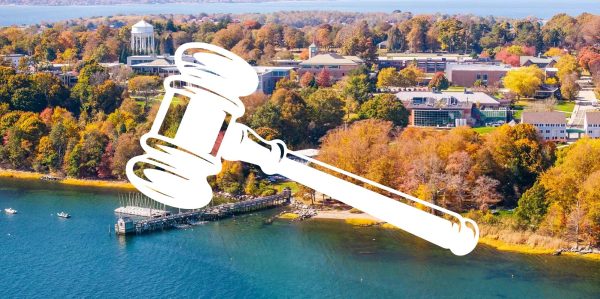Students respond to campus crowding, forced triples
By Rebecca Farias | News Manager
Despite what many individuals among the student body have heard, this year’s crop of freshmen and transfer students was not the largest yet, according to Director of Housing Tony Montefusco. The entire incoming class this year numbered 1,223 students.
The number of those who have chosen to live in university housing (1,132) is not out of the ordinary. Approximately 94 percent of freshmen usually live on-campus, as do 65 percent of transfers. Although these numbers are not atypical, this influx has certainly strained the university’s current housing resources.
“Four new rooms were converted from doubles to permanent triples in the Stonewall buildings,” Montefusco said. “We cut through into the study lounge to make more room.” The university also plans to add triples to Stonewall II and III next year.
“Research shows that the study lounges were not as utilized as we thought, and we thought it was more important that the space be utilized,” Montefusco said.
The university also attempted to solve the overcrowding problem with the new Road Scholars initiative. Along with Vice President of Student Life Dr. John King and Vice President for Enrollment Management and Marketing Brian Williams, Montefusco reached out to 176 incoming freshman and transfer students who each received an email detailing the Road Scholar program.
“We reached out to students within a commutable distance of 30-40 minutes away, trying to reduce the number of temporary triples,” Montefusco said.
Montefusco explained that the university offered specific incentives for those who choose to commute, including Hawk Dollars, free parking passes, tuition discounts, and “priority placement” for next year’s housing.
Nine students accepted the incentives, which meant that 27 students were not placed in “temporary triples.” Montefusco stated that only two more temporary triples were created this year in comparison to last year.
Montefusco also revealed that construction will resume on Bayside IV next year, with the plan being the addition of forty beds.
“Overall, we’re making positive changes,” he concluded.
Nick Polinsky is a freshman living in a temporary triple. Formerly a double, the university enlarged his Stonewall IV room by knocking down a wall, conjoining it to a former study room. Although he had not chosen to live in a triple, Polinsky was given advance notice. Looking on the bright side, Polinsky explained that he thinks he has had an even “better chance of getting along with my roommates, because there are three of them.”
Polinsky added, “[my roommates] are pretty cool with it, and generally we’ve had no problems with space. We’ve even had people over – all the upperclassmen are interested in seeing [the triple].” In his opinion, living in a triple is inconvenient, but serves the best interests of the students and of the university.
“If they didn’t do things like that, maybe some people wouldn’t be able to go to college,” he said.
Freshman Milton Westgate, one of the few students to accept the Road Scholars program, was originally indecisive about commuting, but the program helped him decide. Westgate noted that he wasn’t particularly surprised that the university was pushing for commuters.
“I know Roger has been growing every year. I’ve heard it from my sister, and from some of the sophomores, that this has been a huge burden on the school.”
Despite the change of plans, Westgate hasn’t experienced any major difficulties in commuting so far.
“I’ve been spending a lot of time on campus. I’m always here, and I come back at night,” he said. In fact, he would much rather be a commuter than a resident this year.
Westgate added, “Although I would consider living here, not having a car was a big factor. It’s less restrictive, having a car. I might use the package to live here later. It’s only the first week!”





